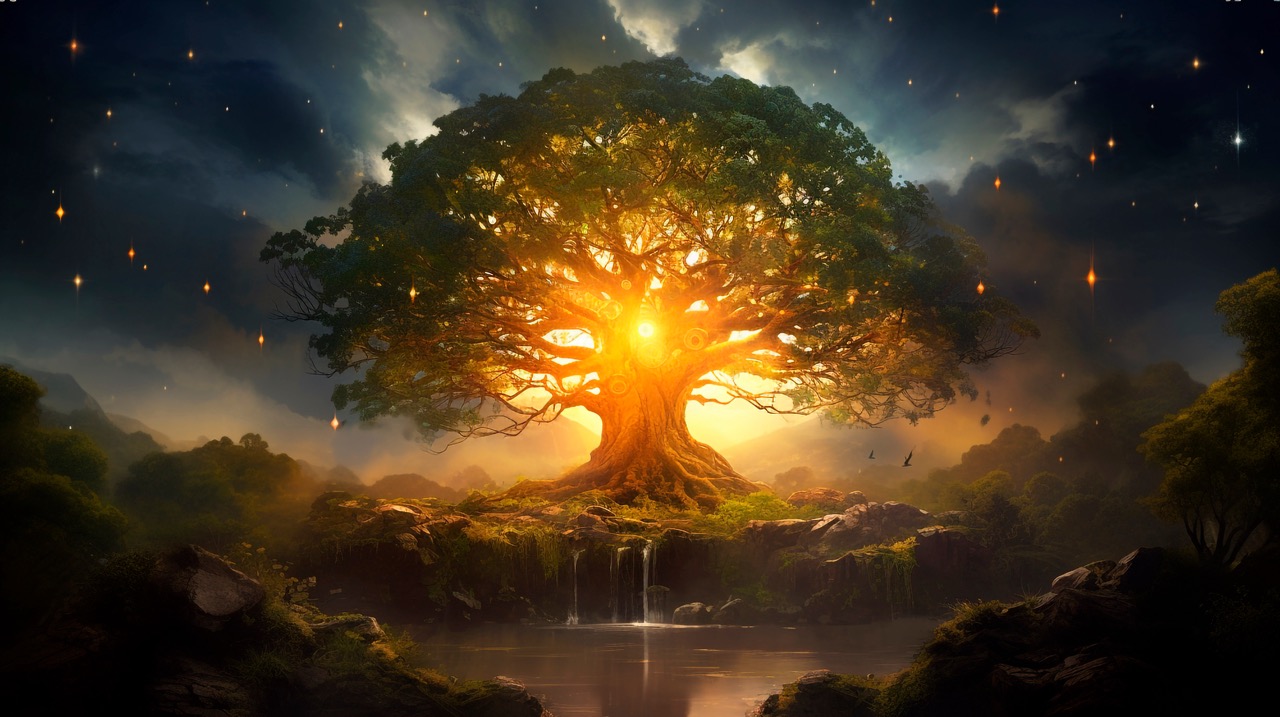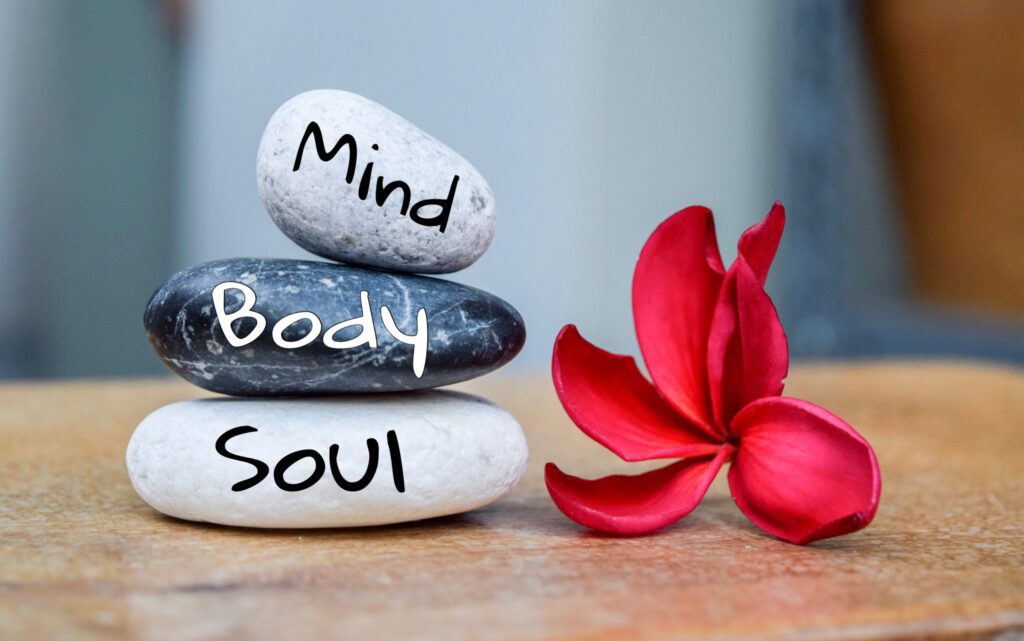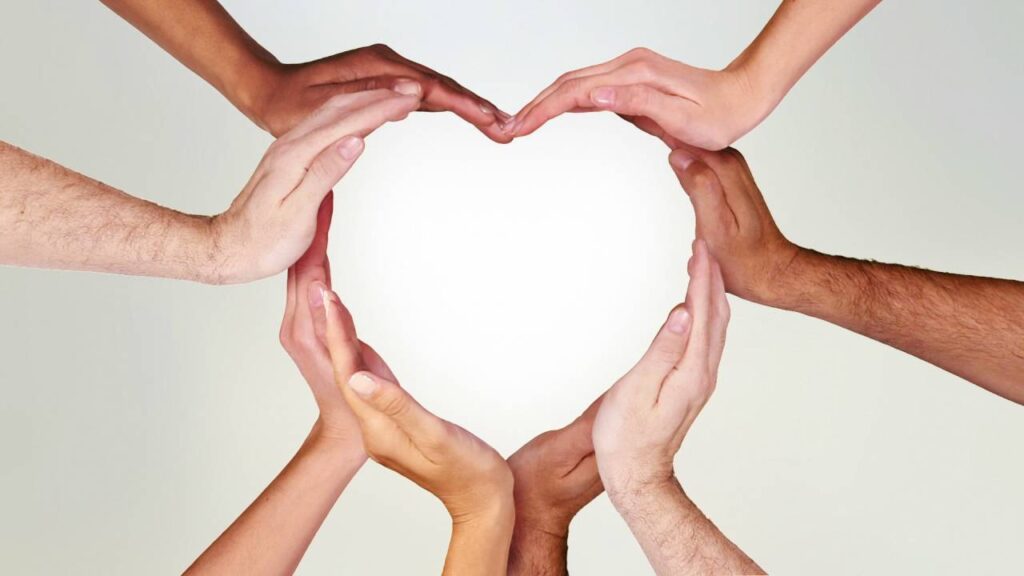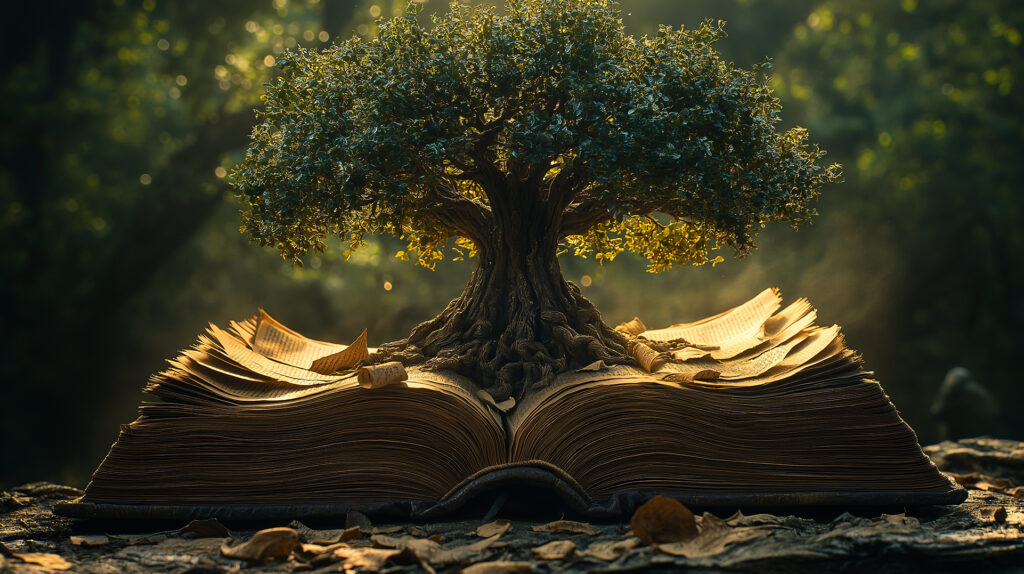TL;DR: Mainstream religions—Christianity, Judaism, Islam, Buddhism, Hinduism—may seem diverse, but they share universal truths about responsibility, morality, gratitude, suffering, and reflection. These principles transcend specific doctrines, acting as cultural algorithms honed by evolution to help humans navigate life’s chaos and build thriving communities.
From moral systems like the Golden Rule to rituals fostering unity, these teachings serve as humanity’s operating system, guiding us toward growth and resilience. Regardless of belief, these axioms reflect timeless survival strategies, offering tools to transform personal and societal challenges into meaningful progress. They’re the essence of civilization’s enduring wisdom.

Think about this: across thousands of years and the vast expanse of human history, spanning continents, cultures, and wildly different ways of life; humans have independently developed religious traditions that are, at first glance, completely very different from one another. Each tradition arose in its own context, shaped by unique struggles with the unknown, the inevitability of death, and the relentless quest to make sense of existence.
But when you zoom in, something fascinating happens when you look past the surface. You’ll notice something remarkable: recurring themes. Kindness toward the suffering. Honor for the higher principles. A drive to place integrity above self-interest.

These ideas aren’t just coincidences. Within Christianity, Judaism, Islam, Buddhism, Hinduism, or any major faith, all emerging in different places and times, they share these core moral insights. Think about that for a second and what that means. It’s as if a monk meditating in a remote Himalayan cave, a medieval theologian in Europe, and a prophet in the deserts of Arabia somehow tuned into the same cosmic frequency. Why is that?

It’s not random. They seem to point to something deeper, something universal about being human. They resonate with our shared experiences: the struggle with suffering, the pursuit of purpose, and the necessity of choosing cooperation over conflict. These are the enduring truths inherited from our ancestors, refined over millennia. Ineffective ideas faded away, while the meaningful ones endured, shaped by tens of thousands of years of human evolution. In other words, these values exist because they work. They are the principles that helped us survive, thrive, and make sense of the world.
Religions act like repositories of evolutionary wisdom
What if your an atheist, or don’t believe in God. To dismiss these moral insights just because they’re wrapped in religious context is to overlook centuries of accumulated wisdom. Wisdom forged in the crucible of human experience from our battles with despair, mortality, and the fundamental question of what it means to live a good life. Crafted by countless generations grappling with life’s complexities. They’ve been etched into our collective psyche, not by chance, but by necessity. Ignoring them is like throwing away the user manual for being human.
Let’s investigate these foundational spiritual principles and reflect on the deeper meaning they offer across diverse traditions.
1) The Role of God in Human Survival
Why do religions so often gravitate toward transcendent concepts like God, Nirvana, or Brahman? It’s a remarkable insight into our evolutionary humane psyche. Sure, the concept of God might have started as a way to explain the mysteries of the world. But its deeper utility is undeniable: acting as though a higher power is observing us drives accountability and moral action. From an evolutionary perspective, this idea has been a cornerstone for group survival and long-term stability.

It seems to me that this transcendent idea emerges from the depths of human experience as a symbolic representation of the highest conceivable good. A transcendent ideal that guides our actions and organizes our societies. It’s not about a supernatural being in the sky but rather an archetype that encapsulates the wisdom of countless generations, distilled into a framework that provides meaning, order, and stability.
How Religions Share the Concept of a Higher Power:
- Christianity, Judaism, and Islam center on monotheism, the belief in one God who is omniscient, omnipotent, and benevolent.
- Hinduismaccommodates both monotheistic and polytheistic interpretations, emphasizing a supreme reality called Brahman.
- Buddhism, while non-theistic, acknowledges transcendent realities like Nirvana, a state of ultimate liberation.
At the heart of most religions lies the recognition of a higher power or ultimate reality. This shared belief in a power greater than oneself fosters a sense of humility and interconnectedness with the cosmos.
2) The Foundation of Ethical Commandments
Religious moral codes like the Ten Commandments or the Eightfold Path aren’t about controlling behavior. They’re about awakening. They’re signposts pointing us back to the truth of who we are beyond the mind.

Dishonesty, for example, arises from the ego the fear-based illusion of separation and narrative control. Honesty, on the other hand, connects us to the flow of life, where trust and cooperation naturally emerge. The Golden Rule is a beautiful reminder: what you do to others, you do to yourself. At the deepest level, these teachings guide us toward presence, toward living in harmony with the now.

Humans are self-interested by nature, but trust and fairness are what allow us to work together and build societies. Our societies prosper when this principle is honored because it fosters trust, fairness, and goodwill. When it is ignored, communities suffer, and chaos ensues. It’s no surprise that such a powerful idea would be seen as sacred—its ability to sustain stability and nurture growth makes it a cornerstone of life itself.
The concept of the Golden Rule appears in almost every major religion, and from a game-theory perspective, it’s genius. And that’s why these moral systems persist. While the specifics differ, the core idea is the same: human actions should promote harmony, fairness, and goodwill.
The Shared Conception of The Golden Rule:
- Christianity:“Do unto others as you would have them do unto you” (Matthew 7:12).
- Judaism:“What is hateful to you, do not do to your neighbor” (Talmud, Shabbat 31a).
- Islam:“None of you [truly] believes until he wishes for his brother what he wishes for himself” (Hadith).
- Buddhism:“Hurt not others in ways that you yourself would find hurtful” (Udanavarga 5:18).
- Hinduism:“This is the sum of duty: do not do to others what would cause pain if done to you” (Mahabharata 5:1517).
Shared Moral and Ethical Frameworks:
- Christianity:The Ten Commandments and Jesus’ teachings emphasize love for God and neighbor.
- Judaism:The Torah provides ethical commandments focusing on justice, charity, and respect for others.
- Islam:Sharia law and the Five Pillars promote values like charity (Zakat), truthfulness, and patience.
- Buddhism:The Eightfold Path advocates right speech, action, and livelihood.
- Hinduism:The principle of Dharma stresses righteousness and duty.
Humans are inherently self-interested, and cooperation doesn’t come naturally. But evolutionary biology shows us that mechanisms like reciprocal altruism and reputational incentives can make cooperation a winning strategy. Religions take these natural mechanisms and encode them into moral systems, ensuring they’re passed down through generations.
3) Rituals: The Glue of Community
Why are rituals such a consistent feature of religion? Whether it’s daily prayers in Islam, the Eucharist in Christianity, or Buddhist meditation, these practices show up everywhere. But why? Are they just arbitrary traditions, or is there something deeper going on? Well, as it turns out, rituals are far from random. They’re incredibly functional.

Rituals, just as they provided structure and stability for early humans, remain profoundly relevant and effective for us today. In the modern world, where craziness often takes the form of overwhelming schedules, constant connectivity, and rapid societal change, rituals can serve as grounding practices. Daily meditation, gratitude journaling, or even communal traditions like holiday gatherings create anchors amidst the turbulence, helping individuals feel connected to themselves and others.

Psychologically, rituals still provide a sense of control in uncertain times. Whether it’s a morning routine to start the day or a moment of reflection before meals, these practices help us cope with stress and uncertainty by offering familiarity, rhythm and structure. Participating in shared rituals like family dinners, religious services, or national traditions strengthens bonds and reinforces a collective identity. Ultimately, rituals today serve the same core purpose they always have: aligning individuals with a sense of order, connection, and meaning. They remind us of our place within a larger whole, whether that’s a community, a family, or the natural flow of life itself.
Rituals Shared Amongst Different Religions
- Christianity:Communion, baptism, and prayer rituals promote unity and spiritual connection with God and the community.
- Judaism:Sabbath observance and Passover rituals reinforce identity and cultural continuity.
- Islam:Salah (daily prayers) and Ramadan fasting strengthen discipline and communal bonds.
- Buddhism:Meditation and mindfulness practices foster inner peace and alignment with the Dharma.
- Hinduism:Puja (worship) and festivals like Diwali celebrate spirituality and cultural identity.
So, rituals aren’t just about faith or tradition—they’re a survival strategy, deeply rooted in both our psychology and social evolution.
4) The Sacred Duty of Responsibility
Responsibility is a concept that every major religion emphasizes. Why is responsibility so universally valued? I know this principle seems obvious, but human beings are social creatures. It’s not just a moral guideline or a philosophical aspiration; it’s a survival strategy, baked into the way humans have evolved to thrive. Responsibility is what aligns individual actions with the greater good. It’s a system, honed by thousands of years of cultural evolution, to ensure not only that we survive but that we thrive together.
“Bear your cross” and “right action” are not mere platitudes, they are strategies for finding meaning through hardship.
Responsibility isn’t easy. It’s framed as sacred in religions like Christianity and Buddhism precisely because it’s transformative. The Christian idea of “bearing your cross” or the Buddhist focus on “right action” isn’t about making life simpler; it’s about engaging with life’s challenges head-on. Something many people wouldn’t mind to avoid. It asks us to voluntarily take on hardship, and in doing so, something remarkable happens: struggle becomes meaning, and chaos is shaped into order.
How Religions Talk About the Importance of Responsibility
- Christianity:The teaching to “bear your cross” and care for others emphasizes personal and communal duty.
- Judaism: Tikkun Olam (“repairing the world”) inspires ethical responsibility to improve society.
- Islam:Zakat (charity) and other pillars stress the importance of helping the community and the less fortunate.
- Buddhism:Right action encourages accountability for one’s deeds and compassion toward others.Right action encourages accountability for one’s deeds and compassion toward others.
- Hinduism:The principle of Dharma promotes fulfilling one’s duties to family, society, and the self.
So, what does this mean for us today? It means that responsibility isn’t just an ancient idea—it’s an adaptive tool, one we can use to navigate modern challenges. It’s proof that some of the oldest principles in human history are still relevant, even in our ever-changing world.
5) The Recognition of Suffering as a Catalyst for Growth
Life is suffering—there’s no escaping that. It’s a fundamental truth of the human condition, recognized across every culture and era. From the pain of birth to the inevitable losses and failures of life, suffering is inescapable. But here’s the remarkable thing: religions don’t view suffering as meaningless. Instead, they treat it as a necessary challenge, something that can be transformed into growth and purpose.

Think about it. You rarely grow as a person or grow spiritually when things are going well. Religions treat suffering as a vital puzzle, a riddle etched into the world, meant to push us toward greater understanding. This reframing suggests that the very experiences we dread may actually guide us if we have the courage to face them. In transforming chaos into order, religions remind us that suffering can serve as a necessary catalyst, prompting us to engage more deeply with life’s eternal questions.
The Shared Religious Concept of Suffering
- Christianity:Suffering is seen as redemptive, a way to participate in Christ’s passion and grow closer to God.
- Judaism:Trials are viewed as opportunities for perseverance and strengthening one’s faith in God’s plan.
- Islam:Patience in the face of adversity (sabr) is highly praised, seen as a test of faith and devotion.
- Buddhism:The Four Noble Truths address suffering (dukkha) directly, offering a path to liberation through understanding and mindfulness.
- Hinduism:Suffering is often understood as a consequence of karma, a reminder to align actions with dharma to break the cycle of rebirth.
So, suffering? It’s not just an obstacle. It’s a teacher, a unifier, and, ironically a gift. Religions don’t celebrate suffering, but they don’t shy away from it either. Instead, they ask us to meet it head-on, to transform it, and in doing so, to transcend ourselves; which is kind of beautiful.
6) The Importance of Gratitude
Gratitude is not merely a fleeting feeling of appreciation; it is a profound psychological discipline. When you practice gratitude, you’re engaging in the conscious recognition of the good in your life, and this shifts your perception of the world. It’s not that life stops being difficult—chaos and suffering are embedded in the human condition—but gratitude reorients you toward meaning and stability amidst that chaos.

By acknowledging what you have, rather than fixating on what you lack, you align yourself with a narrative of responsibility and fortitude. Gratitude is also a bulwark against the corrosive forces of resentment, which, if left unchecked, can spiral into malevolence. It’s a mechanism of individual resilience and social cohesion.
Acknowledging the good that you already have in your life is the foundation for all abundance. – Eckhart Tolle
This is where religion comes in. Religions institutionalized gratitude because it amplified the cohesion and resilience of their communities. It’s no accident that gratitude rituals like prayers of thanks or offerings are common. It’s a cognitive hack, one that allows us to maintain perspective even in the face of hardship. Keep in mind, religions, in this sense, act like repositories of evolutionary wisdom, preserving practices like gratitude because they’ve been shown, over millennia, to improve survival and well-being.
How Religions Share the Concept of Gratitude
- Christianity:The act of giving thanks, central to prayers and rituals like the Eucharist, strengthens faith and contentment.
- Judaism:Blessings (brachot) are recited daily to express gratitude for life’s gifts, big and small.
- Islam:Gratitude (shukr) is a fundamental virtue, deeply connected to worship and submission to God’s will.
- Buddhism:Grateful awareness is a cornerstone of mindfulness, encouraging appreciation of the present moment.
- Hinduism:Devotional practices often center on thanking the divine for life’s abundance and challenges.
So, gratitude isn’t just sentimentality. It’s an adaptive tool and a product of our evolutionary journey that continues to pay dividends, both biologically and culturally, today.
7) Prayer & Meditation for Transformation
Prayer and meditation are two sides of the same coin when it comes to transformation. Prayer is the act of speaking to God, or the universe—an outward expression of your deepest desires, questions, and struggles.

When you talk things out clearly and precisely, it makes more sense in your mind and orients you, aligning you with a higher purpose. But it is only through meditation that you truly listen. In silence, you cease your talking and allow yourself to receive what is beyond your immediate understanding, making a conscious effort to disconnect and find new meaning.

It is in this space of quiet listening that transformation can occur, for it is here that you are most open to receiving the insights and guidance necessary for true change. Together, prayer and meditation allow you to both assert your will and surrender to the deeper wisdom of existence.
The Shared Concept of Prayer & Meditation
- Christianity:Prayer and meditation are tools for aligning one’s will with God’s and seeking divine wisdom.
- Judaism:The emphasis on Torah study promotes a lifelong commitment to understanding and ethical reflection.
- Islam:Reflection during salah (prayer) and fasting during Ramadan deepens self-awareness and spiritual insight.
- Buddhism:Meditation and mindfulness practices encourage self-discovery and clarity of thought.
- Hinduism:Practices like yoga and jnana (knowledge) seek to connect the self with ultimate truth.
And when we reflect, we don’t just improve ourselves. We lay the groundwork for a better society because a reflective individual is a responsible individual. And a responsible individual is the cornerstone of a stable, flourishing world.
The Foundations of Humanity’s Shared Wisdom
All in all, these truths function as humanity’s user manual for its greatest challenges, the cultural algorithms of thriving, the distilled collective intelligence of our species, and the moral scaffolding of civilization.

What we often fail to recognize is that these shared spiritual axioms across religious traditions aren’t merely cultural artifacts, they are the operating system of civilization. The principles of responsibility, humility, gratitude, and the moral structures they inspire represent the collective intelligence of humanity, refined over tens of thousands of years. They are the axioms that have allowed us to survive and, in many cases, thrive in the face of life’s unrelenting suffering and pain.
Whether you accept the metaphysical claims of religion or not, the fact remains that these frameworks have functioned as humanity’s best defense against the entropy of existence. They’ve given us a way to align individual behavior with collective survival, to transform suffering into growth, and to create stability in an inherently unstable world. That is not a small achievement. It’s the very reason we’ve made it this far.

It also opens the question of why do these principles work? One explanation is that they’ve been shaped by evolutionary pressures. Over thousands of generations, they’ve acted as a kind of cultural software, encoding the collective wisdom of humanity. Whether or not you believe in a higher power, these principles are like a user manual for civilization—a guide to turning chaos into order.
And that raises another question: why did these patterns emerge across such different cultures? Is it something innate to human psychology, or is it a result of our evolutionary history? Maybe both. Maybe we’re wired to seek these answers, and maybe that’s why these systems persist.
Even if you don’t subscribe to any particular faith, you’re already a part of this grand, centuries-long conversation. And here’s the kicker: these principles aren’t just historical curiosities. They’re relevant right now, available to you. They’re universal. They’re human. They’re the evolutionary wisdom that has been passed down to us since the beginning of human kind.
More from Featured
Truth Is Stranger Than Fiction: These 6 Facts Prove It
Interesting facts are like a secret backdoor. They let you see the world in ways most people never notice. Occasionally, …
The Real-Life Simpsons: A Bold Reimagining Hits Theaters in 2025
https://www.youtube.com/watch?v=GUWxoP1pmis The upcoming 2025 release of The Real-Life Simpsons may be the most absurdly ambitious gamble Hollywood has taken to date. …
The Real Cost of Participation Trophies: How We Raised a Generation of Entitled Adults
It’s the age-old story of the participation trophy, that shiny piece of plastic designed to placate little Timmy after his …



















